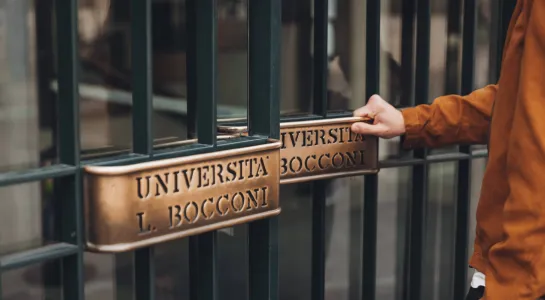
Sara’s Lesson: If You Believe, You Can
Sara Scrittore had one thing in mind when she graduated high school – studying mathematics; but Bocconi was certainly not the top choice in mind. She took the test, almost for fun, after being selected by Soroptimist International as one of the brightest high school graduates in Italy. “If I am selected, what are we going to do?” Sara remembers asking her parents – her father, an employee at a steel plant, and her mother, a housewife. She was alluding to the University’s burdensome tuition fees compared to those of a public university. “They encouraged me, and have always wanted my brother and me to graduate, so they told me not to think about it, that somehow we would manage it.” They did, after all, and Sara Scrittore was able to graduate in Business Administration – also thanks to the scholarships made available by the University – and begin a high-profile career leading to her role as Executive Vice President and General Manager, South Europe Hub at Colgate-Palmolive.
“If I had not attended Bocconi, I would probably be teaching math today,” Sara says, recalling her high school passion. She, of course, has no regrets, given her career path. “In 1994 I joined Colgate-Palmolive in logistics,” she explains, “which greatly interested me, but I soon realized that this was not a company where you did just one thing and specialized in that. After a while, I changed jobs and moved into sales. I have basically always stayed here, but have had various professional experiences.” One includes a 20-year long stint abroad, which was not the original plan, at least in these terms. “When I was asked to work abroad, my husband, Massimo – whom I met at Bocconi – and I accepted the offer with enthusiasm, but we thought that it would be a short-term experience.” In 2001 she embarked on an international career that took her to Asia, Portugal and the United States. “I changed roles and accepted new, different challenges, following along with what is a well-established corporate culture that offers unique opportunities for those with the courage to get involved,” she says. Her predisposition for openness and change was innate, but somehow instilled from her university days: “Bocconi back in the 1980s was an international, stimulating and competitive environment that rewarded merit. As daughter of working-class parents, I never felt that I had fewer opportunities than the children of entrepreneurs,” Sara Scrittore recalls. “Having a scholarship encouraged me to do well and to do it quickly." Sara's story is certainly an example, one of which she is aware and for which she willingly accepts the responsibility: “I am sorry to see that there is much more fear of failure among today’s youth than those of my generation, almost a sort of self-censorship. I, on the other hand, say that they have to try; maybe it will go well or maybe not, but the important thing is to try. The academic level of Bocconi, in particular, is very high; it is very demanding, but offers just as much in terms of support, and availability of teachers and various services.”
Sara Scrittore has recently been included in Changed by Women, the project that tells the stories of Bocconi alumnae whose path can serve as an example for young women. What would Sara like to tell them? “Young women tend to think that it was much more difficult for a woman to have a career 20 or 30 years ago, and that is certainly true. When I am in meetings with executives at my level, the number of women present is far from 50%. However, throughout my career I have never felt discriminated against or hindered. The corporate climate at Colgate-Palmolive has always been favorable for everyone. I am proud of my career and I wish to tell young women that anyone can have a chance if they believe.”
translated by Rosa Palmieri
